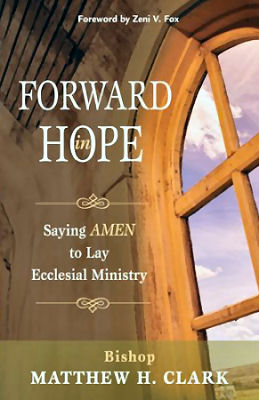
|
Posted December 5, 2009
Book: Forward in Hope: Saying Amen to Lay Ecclesial Ministry Author: Bishop Matthew H. Clark Ave Maria Press. Notre Dame, IN. 2009. Pp. 114 An Excerpt from the add for the book:
A long-time advocate of and leading voice in lay ecclesial ministry, Bishop Matthew Clark (Diocese of Rochester) will release Forward in Hope: Saying Amen to Lay Ecclesial Ministry on November 22, 2009. Clark writes, “I offer in this book my personal thoughts on lay ecclesial ministry and stories from my thirty years experience as bishop, forty-seven as a priest, and a lifetime of being a Catholic because I believe we can build a better understanding and wise embrace of lay ecclesial ministry. What do lay ministers actually do? According to the 2005 document from the U.S. Bishops titled Co-Workers in the Vineyard of the Lord: A Resource for Guiding the Development of Lay Ecclesial Ministry, more than 40 percent are directors of religious education, one-fourth are general pastoral associates, and others are youth ministers, music ministers, or are involved in liturgical planning. The same document notes that two out of three U.S. parishes now have paid lay ministers on staff. Clark knows that the function and role of lay ecclesial ministers is still evolving, and is part of an ongoing dialogue within the Church. In the introduction to Forward in Hope, Clark writes, “The meaning, contexts, and distinctions of baptismal and ordained ministries, requirements for formation and accountability, the acceptance of lay ecclesial ministers in the life and mission of the Church, fair employment practices, just compensation, and matters related to due process are but a few of the issues with which we Catholics now must grapple as we seek to incorporate lay people working in professional Church ministries.” An Excerpt from the Book: If lay persons exercise significant leadership in the Church, what is their social place? If it is not in some way with other official ministers, bishops, priests, and deacons, their understandings, values and attitudes will not be influenced by those relationships. (And conversely, neither will the other official ministers be influenced by them.) Furthermore, over time many will experience anger at the marginalization they experience in relation to the other formal leaders in ministry . . . . Without identification as well with the larger body of official matters, fragmentation rather than unity is fostered. Because a primary function of the bishop is as the center of unity within his diocese, it is the establishment of a formal relationship with the bishop that will contribute to a greater unification of all the official ministers in the local Churches. In a Church striving to be collaborative, such unity is essential. Table of Contents: 1. One bishop’s story 2. What lay ecclesial minsters say 3. Voices from the vineyard: Rose Davis 4. A consideration of history 5. Voices from the vineyard: Patrick Fox 6. The impact of Vatican II 7. Voices from the vineyard: Charlotte Bruney 8. The bishop and lay ecclesial ministers 9. Voices from the vineyard: Anne-Marie Brogan 10. Women in ministry 11. Voices from the vineyard: Deb Housel 12. Men in lay ministry |
|
